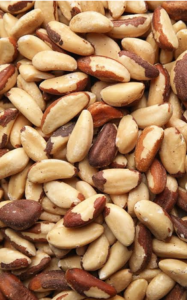Earlier we covered organic Brazil nuts and organic almonds as superb sources of nutrition and how they help our environment too. Today we bring yet another unique nut which is native to the beautiful continent of Africa. Yes, African walnuts, scientifically known as Coula edulis, are native to the rainforests of West Africa. Beyond their delicious taste, these walnuts offer a myriad of benefits that extend to both health and the environment. In this article, we will delve into the various advantages and benefits of African walnuts and how adding them to your diet can contribute to a greener and more sustainable world.
Nutrient-Rich Powerhouses
Rich Source of Omega-3 Fatty Acids
African walnuts are very well known for their high omega-3 fatty acid content [1]. Omega 3 is an essential fatty acid that plays a crucial role in supporting our heart health. They do so by reducing inflammation and promoting optimal cholesterol levels. Therefore, incorporating them into your diet may positively contribute to a healthier cardiovascular system.
Abundant in Antioxidants
African walnuts are well endowed with antioxidants. These help combat the oxidative stress within the body. They are mainly polyphenols and vitamin E which help in neutralizing harmful free radicals, protecting cells from damage, and reducing the risk of chronic diseases.
Excellent Protein and Fiber Content
And for our plant lovers who love seeking plant-based protein sources, African walnuts are an excellent choice. Their high fiber content aids in digestion and promotes satiety, which helps maintain a healthy weight.
Environmental Benefits
Sustainable Cultivation Practices
Coming down to the environmental benefits, African walnuts are predominantly grown in agroforestry systems. This means that it integrates tree cultivation with other crops. This approach is known to promote biodiversity and prevent soil erosion. Thereby enhancing overall environmental sustainability. When we choose products from such eco-friendly practices, we contribute towards the conservation of natural resources.
Carbon Sequestration
Oxford Dictionary defines carbon sequestration as a natural or artificial process by which carbon dioxide is removed from the atmosphere and held in solid or liquid form. The trees that produce African walnuts do the same thing, by actively cleaning our air off carbon dioxide. With this ability to absorb and store carbon dioxide, they help mitigate the impact of greenhouse gas emissions. As a result, it makes them a valuable asset in the fight against climate change.
Reduced Deforestation
The cultivation of African walnuts often occurs in existing rainforests. This means that it somewhat discourages the need for clearing out chunks of trees, a.k.a deforestation. Therefore, by harnessing the economic potential of these native trees, communities are incentivized to preserve rather than exploit their natural environments.

Supporting Local Economies
Economic Empowerment
African walnut cultivation provides a source of income for local communities, fostering economic empowerment. Sustainable harvesting practices ensure the longevity of this income source, contributing to the overall well-being of these communities.
Employment Opportunities
The cultivation and processing of African walnuts happens predominantly in Africa. This creates job opportunities within local African communities that often face the exploitation of modern-day industrialization. By getting involved with native greenery and production, these people get ample employment opportunities while also providing value to the entire world.

Aligning with Green Living
Minimal Packaging and Processing
African walnuts often require simple and minimal processing and packaging compared to other snack options. Thus, by choosing these nuts over highly processed alternatives you reduce the environmental impact.
Conclusion
Thus we saw how African walnuts offer a myriad of health benefits and also support environmentally friendly and sustainable practices. This article is not exhaustive and there are even more benefits of African walnuts that we haven’t covered here. Let us know your experience with this nut and tell us what you liked about it. We would love to hear your feedback!





